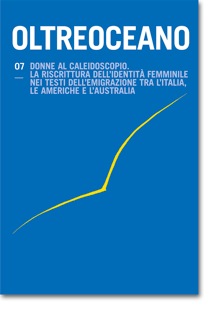L’identità femminile: riti e percorsi per un ritorno in patria in Natives of My Person di George Lamming
Keywords:
Lamming, viaggio, Colonialismo, Indie OccidentaliAbstract
L’ultimo romanzo dello scrittore barbadiano George Lamming che presenta una trama solo apparentemente semplice: il viaggio seicentesco della nave Reconnaissance risulta essere un espediente per condurre un’analisi dell’età coloniale e della fase post-coloniale nell’arcipelago caraibico, nonché uno studio dei sistemi di potere e dei rapporti interpersonali all’interno delle società gerarchiche e patriarcali che il colonialismo ha generato. Esso si configura come una complessa ed enigmatica allegoria che abbraccia tutta la storia delle Indie Occidentali, dall’epoca della colonizzazione europea delle Americhe fino ai giorni nostri.
Feminine Identity: Rites and Paths towards a Return Home in George Lamming’s Natives of my Person
The present study concerns the last novel by Barbadian writer George Lamming. The plot is apparently simple: the voyage on board the Reconaissance in the XVII cent. is barely an expedient for a historical analysis of the colonial and post-colonial period in the Carribean Archipelago. The novel examines the ambiguity and complexity of the power system and inter-personal relationships within the hierarchical and patriarchal societies generated by colonialism. The result is that of a complex and enigmatic allegory embracing the whole history of the West Indies, from colonial times to the present.
Downloads
References
Boxhill, A. (1973): San Cristobal Unreached: George Lamming’s Two Latest Novels. World Literature Written in English, 12, 1, pp. 111-121.
Dalleo, R. (2006): Authority and the Occasion for Speaking in the Caribbean Literary Field: Martin Carter and George Lamming. Small Axe, 20, pp. 19-39.
Eisler, R. (1995): Sacred Pleasure: Sex, Myth and the Politics of the Body. New York: Harper Collins.
Eisler, R. (1995): The Chalice and the Blade. Our History, Our Future. New York: Harper Collins.
Kent, G. (2011): A Future They Must Learn: An Interview by George Kent. In A. Bogues (Ed.), Caribbean Reasonings. The George Lamming Reader: The Esthetic of Decolonisation (pp. 149-170). Kingston: Ian Randle Publishers.
Lamming, G. (1971): Water With Berries. London: Longman.
Lamming, G. (1979): Season of Adventure. New York: Allison and Busby.
Lamming, G. (1983): In the Castle of My Skin. New York: Schocken Books.
Lamming, G. (1984): The Emigrants. London: Michael Joseph.
Lamming, G. (1992): Natives of My Person. Ann Arbor: The University of Michigan Press.
Lamming, G. (1995): The Pleasures of Exile. Ann Arbor: The University of Michigan Press.
Nair, S. (1996): Caliban’s Curse: George Lamming and the Revisioning of History. Ann Arbor: The University of Michigan Press.
Pouchet Paquet, S. (1982): The Novels of George Lamming. Kingston: Heinemann.
Downloads
Published
How to Cite
Issue
Section
License

This work is licensed under a Creative Commons Attribution-NonCommercial-ShareAlike 4.0 International License.
The authors undertake to comply with the following conditions, which are considered accepted at the time of submission of their contributions.
The sending of a text implies that it is unpublished and not submitted to be published elsewhere.
1. If accepted, the author shall confer on the publisher the right to publish and distribute it both in paper form and in the online electronic edition. The published articles will be downloadable and made available in open access.
2. Provided that it correctly indicates that the first publication took place in the journal Oltreoceano. Rivista sulle migrazioni the author has the right to: a) reproduce the article in separate extracts or collected in a volume; b) publish the article on their personal website or teaching site provided that these sites are of a non-commercial nature; c) deposit the article in online archives of a non-commercial nature, linked to the institution they belong to or as part of projects for the non-commercial dissemination and open access of scientific works.
The use of contributions by third parties, for commercial or otherwise unauthorized purposes, is not allowed. The publisher declines all responsibility for the unauthorized use of the material published in the journal.












